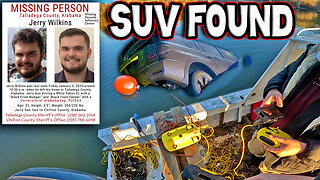Premium Only Content

Veils of the Serpent
"Veils of the Serpent" is an intense and empowering anthem that reveals the hidden forces controlling humanity from the shadows. With haunting lyrics and a powerful message, this song speaks to the awakening of humanity as we tear through the webs of deception and reclaim our freedom. "Veils of the Serpent" is a call to rise, resist, and break free from those who have manipulated us for far too long.
🎶 Unveil the truth through music! Like, subscribe, and share!
🔗 Join the movement to break the chains of deception and reclaim power!
💬 Comment below your thoughts on unveiling the truth and standing against hidden control.
💸 Support us via PayPal (link in description) to help us continue creating music that inspires change and awakening.
Follow us for updates on new releases and to be part of the revolution!
Hashtags:
#VeilsOfTheSerpent #AwakeningSong #BreakTheDeception #FightThePower #TruthWillPrevail #StandForFreedom #ExposeTheLies #EmpowermentMusic #RiseUp #HumanityAwakens #SongOfResistance #TearDownTheVeils If someone is enslaved or trafficked, it’s crucial to seek help in a safe and discreet manner. Here’s what to do in the United States or any other country:
1. Seek Immediate Help if Possible
Call Emergency Services: If you are in immediate danger, call your local emergency number (911 in the U.S.).
National Human Trafficking Hotline (U.S.): Call 1-888-373-7888 or text "HELP" to 233733 (BEFREE). This service is available 24/7, confidential, and connects you with trained professionals who can help you find safety and resources.
2. Use Safe Locations for Communication
Reach out from a safe place where you are not monitored, such as a trusted business, a hospital, or a police station.
If you can access a phone, consider using a public phone or someone else’s phone to avoid being tracked.
3. Contact a Trusted Authority or NGO
United States: The U.S. Department of Health and Human Services and U.S. Department of Homeland Security can provide support. Reach out through their trafficking hotlines or local offices.
Internationally: Contact the nearest embassy or consulate of your country for assistance if you are trafficked outside your home country. They can help you connect with local resources and authorities.
4. Document Information Safely
If you have access to write things down safely, try to document:
Your location (any landmarks, addresses, or businesses nearby)
Names of people involved in trafficking or enslaving you
Details about your situation, which may help authorities locate you or assist in rescuing others later.
5. Use Trusted Websites for Guidance
In the U.S., visit the National Human Trafficking Hotline (https://humantraffickinghotline.org) for resources and advice.
Globally, organizations like UNODC (United Nations Office on Drugs and Crime) provide resources for victims and can connect you with local NGOs and services.
Use government sites like U.S. Department of State’s trafficking page (https://www.state.gov/humantrafficking) for additional resources and contact points.
6. Find a Local NGO or Shelter
Contact local shelters or NGOs that specialize in helping trafficking victims. Many have partnerships with the government and offer confidential assistance.
Examples include Polaris Project in the U.S. and international organizations like Hope for Justice or A21.
7. Protect Yourself While Planning to Leave
Try to blend in and avoid raising suspicion if you cannot escape immediately.
Connect with local authorities or organizations when you have a safe opportunity, and follow their guidance for leaving your situation safely.
These steps are designed to help trafficked individuals connect with government resources and professional help.
-
 13:37
13:37
Exploring With Nug
8 hours ago $2.92 earnedSUV Found Underwater Searching For Missing Man Jerry Wilkins!
27.8K -
 DVR
DVR
xBuRnTx
3 hours ago1st Warzone Stream Online
16.6K1 -
 6:10:21
6:10:21
JdaDelete
1 day ago $2.01 earnedDino Crisis - Sega Saturday
23.9K1 -
 23:22
23:22
MYLUNCHBREAK CHANNEL PAGE
1 day agoUnder The Necropolis - Pt 5
32.8K17 -
 2:26:11
2:26:11
Jewels Jones Live ®
1 day agoWINNING BIGLY | A Political Rendezvous - Ep. 108
87.9K38 -
 2:04:49
2:04:49
Bare Knuckle Fighting Championship
4 days agoBKFC FIGHT NIGHT MOHEGAN SUN FREE FIGHTS
33.4K2 -
 25:09
25:09
BlackDiamondGunsandGear
6 hours agoYou NEED to be Training For Whats to Come
30.9K8 -
 20:03
20:03
Sideserf Cake Studio
12 hours ago $1.26 earnedA HUNGRY HUNGRY HIPPOS CAKE THAT ACTUALLY WORKS?
26.3K9 -
 23:51
23:51
marcushouse
13 hours ago $0.89 earnedStarship’s Next Move Is Coming Sooner Than You Think!
17.5K3 -
 22:24
22:24
The Finance Hub
19 hours ago $5.87 earnedBREAKING: JOE ROGAN JUST DROPPED A MASSIVE BOMBSHELL!!!
20.7K22